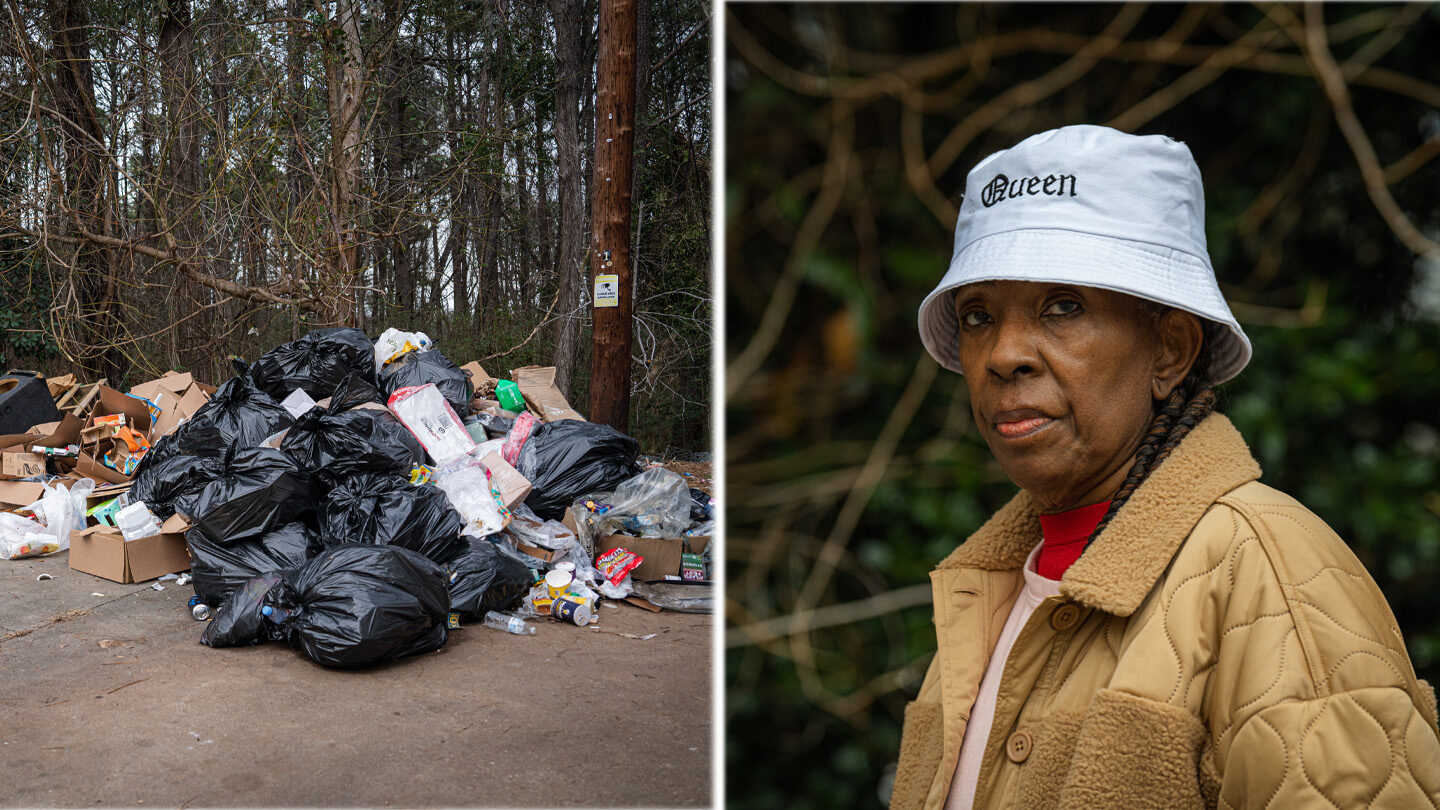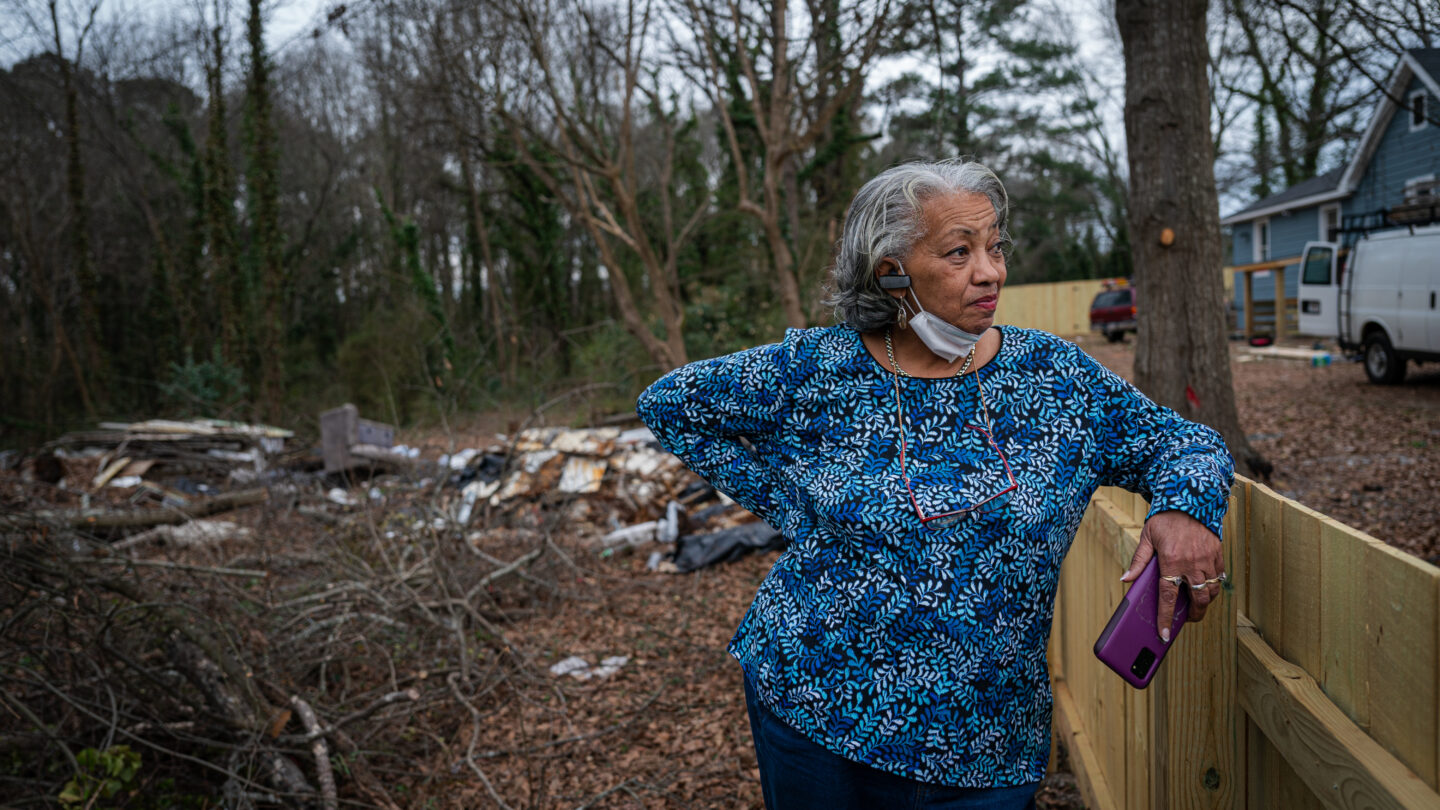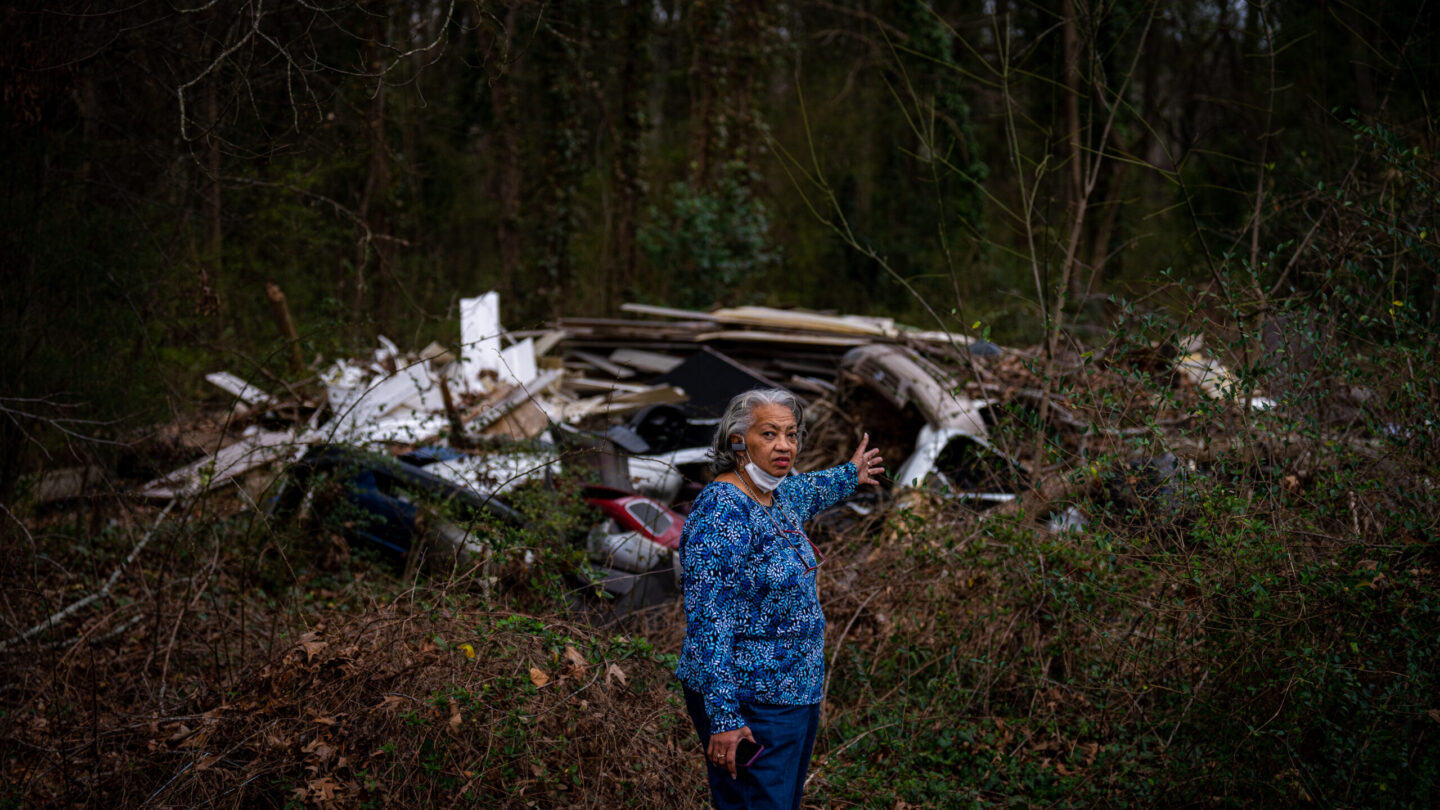This story was reported in partnership with Canopy Atlanta, a community-led journalism nonprofit that partnered with more than 50 South DeKalb residents to choose, report, and present stories. Read the full South DeKalb Issue here.
At the corner of Austin Drive and Easterwood Court in Candler-McAfee, Joscelyn O’Neil, a South DeKalb resident for the past 20 years, stands in front of an unattractive patch of land with trees.
“This has been like this for over a year, maybe two years, maybe three years,” she says. “It looks like a dumping ground. It’s got car parts, tops of houses, shingles, mattresses, lumber.”
This Year on WABE: 2023
2023 was a big year at WABE. We turned 75, launched WABE Studios, and the WABE Newsroom continued to cover the critical issues Atlantans care about most. Here are a handful of stories, photos, television and podcasts we think stand out from this year.
O’Neil drives by the site regularly and recently started paying more attention to how much garbage was piling up. After seeing the conditions worsen, O’Neil filed a service request in late January to DeKalb County’s code enforcement department. As per standard procedure, a code enforcement officer visited the blighted patch later that month to inspect the property.
One month later, the lot was still littered. No change has happened since.
Every time O’Neil files such a code violation, as she has for years now, she thinks about the overall health and safety for all residents in South DeKalb.
“A vacant, neglected property also attracts prostitution, drugs,” O’Neil says. “Homeless people break in and come in and stay in it, because nobody’s concerned about it . . . The longer it sits, the worse it gets.”
Residents like O’Neil in the southern, unincorporated portion of DeKalb County can spend months, even years reporting code violations that seemingly amount to nothing. Last year, an independent audit found 825 code violation cases that remained open for an average of 489 days.

To stay on top of code violations, residents make phone calls and send emails to county leaders, host gatherings with neighbors, and attend meetings with community advisory groups. The long process contributes to growing levels of frustration in the community. Adding to that frustration is how in Atlanta, blight tends to be most concentrated in majority-Black south Atlanta communities like O’Neil’s, according to a 2010 study.
Pedra Stokes of Panthersville has concerned herself with code enforcement issues in the area for the past decade.
“I would cc as many people as I [could], because unfortunately, you’re more likely to get a response,” Stokes says. “But that’s the way that I had been doing it. I would just go onto the DeKalb County government website and pick off as many humans that I could find that had managerial, supervisory titles.”
The county’s backlog of code violations is well documented. But DeKalb residents and county officials disagree over who’s actually responsible for these eyesores.
“Voluntary compliance from the residents and homeowners in DeKalb County would be helpful, because at the end of the day, it’s about community pride and self pride,” says the county’s CEO, Michael Thurmond.
Sandra Holmes of Bouldercrest has been voicing her concerns to the county for over 15 years.
“Every year it gets worse,” Holmes says. “And because it gets worse, people that are coming in this community think that we don’t care. But there’s a lot of people that do care. We just need our elected officials to care.”
The process from code enforcement complaint to resolution is already long and bureaucratic, says Timothy Hardy, DeKalb County’s code enforcement director. The county can’t make any changes to a property without working with the property owner. Even then, code enforcement really makes one main change to private property: demolition. Any other responsibilities and costs fall on the property owner.
“If we have not located the responsible party, it’s going to take a little bit longer for those cases to be resolved,” Hardy says. “And sometimes they’re not resolved in a manner that a next-door neighbor may think is appropriate. If we have to go to court or they fail to appear, then we have to escalate that case even further.”
DeKalb County’s case management software has also been plagued with problems since 2013, when the county was seeing increased demand after the 2009 economic recession. The main problem is having multiple technological systems that don’t talk to each other and must each be updated manually.
“The reporting becomes very difficult or tedious. You get a lot of duplicate entries of data, lost or missing files, even duplication of inspections, because sometimes the actual record of that inspection is not recorded properly. And we end up doing double work at the same location,” Hardy says.
In January, DeKalb County was unable to provide Canopy Atlanta broad statistics, including the total number of code enforcement complaints, the number of unresolved complaints, the and number of resolved complaints in 2022.
Even though the county has released statistics for previous years, like in 2017, DeKalb County Communications Manager Andrew Cauthen says any statistics they provide now—and have previously presented—are unlikely to be accurate under the current outdated system.
At this time, there’s not an efficient and/or accurate way for residents to access or assess how DeKalb County is addressing code enforcement violations.
“I think what happens with some of the residents, when they call in a particular violation, they’re expecting that there’s going to be a kind of a step-by-step update on these cases,” Hardy says. “To be quite frank with you, we handle about 800 or so of those requests a month. So there are no constant reminders or updates.”
That is why residents have joined forces over the years to demand that the county follow up on the ample amount of concerns and reports of code violations.

In the early 2000s, O’Neil met late DeKalb principal and civic leader Gilbert Turman, who chaired the county’s Code Enforcement Advisory Council. She’s been on the council since its inception.
And since 2017, husband Ryan Brown of the DeKalb Citizens Advocacy Council and wife Beth Thompson have run a Facebook group called Do Your Job DeKalb County Code Enforcement, with over 300 members discussing their problems.
Andrea Chait is a member of that Facebook group. She has lived in her Stonecrest neighborhood since the early 2000s. And over the years, she has watched several of her neighbors leave due to the blighted conditions.
“I personally know some people who have moved because of the blight, even though they had to sell their homes at a lower price than desired,” Chait says. “There are posts daily on the Nextdoor app that say folks can’t stand the nasty conditions, and they are selling and moving.”
Do Your Job DeKalb County Code Enforcement launched after a meeting Thompson and several neighbors had with code enforcement staff, expressing concern over a seeming lack of communication with residents.
“Every year it gets worse. And because it gets worse, people that are coming in this community think that we don’t care.”
Sandra Holmes, South DeKalb resident
After the meeting, Thompson filed a request for open records concerning a then-recent reorganization of DeKalb County’s code enforcement department. That open records request took one month to receive a written response and five months to fulfill.
According to state open records laws, government entities are required to respond within three business days.
“Not everyone and every community has the time and knowledge to successfully advocate to elected officials and DeKalb County leadership, nor should they always have to,” Brown says. “Beth and I are passionate about getting the system as a whole fixed so that all neighborhoods, apartment complexes, and business corridors in unincorporated DeKalb can be improved.”
In 2022, O’Neil ran for a state representative seat. Her interactions with code enforcement were a major factor.

Meanwhile, the more Chait chats with her neighbors, the more she realizes the impact that a lack of code enforcement could have.
“Our homes are undervalued by $200,000 because of all this mess going on,” she says. “Black citizens, African Americans are losing their opportunity to build family wealth, because they turn around and they just take whatever they can get to get out. And it’s so, so sad.”
DeKalb County says the light is at the end of the tunnel, with a brand new, fully automated system for data entry set to launch this fall.
The county says it has invested $100,000 in this new technology. That’s on top of millions of dollars that the county has invested in improving code enforcement over the past decade, according to Thurmond.
But as in previous interviews, Thurmond stresses that DeKalb County can only do so much to correct code violations.
“The public believes that code enforcement has the ability to enforce or demand that certain alleged violations be corrected,” Thurmond says. “Code enforcement officers can negotiate an alleged violation but they have no enforcement authority whatsoever.”
And so there is a lack of trust between South DeKalb residents and the county, to the point where for some residents, hearing about a “new system” does not increase faith in the county.
“I do not believe anything that anybody at DeKalb County government says is going to happen until it happens,” says Stokes.
Down I-285, seven miles from the blighted lot O’Neil reported to code enforcement in January, are two gas stations off Bouldercrest Road that display what O’Neil calls “just total destruction of a piece of property.”
“I’ve personally been reporting issues with the gas stations for the last three years,” Stokes says. But, she says, all code enforcement did was fine the owners $75.

Behind a Citgo station dumpster, ironically, is even more trash scattered among the trees. O’Neil looks across the street, at what used to be a Shell fuel station, noticing “…tires, mattresses, just garbage, all sorts of things that have been dumped out here.”
O’Neil stands astonished by the loose trash and debris.
“No respect,” she says. “Why can’t we get folks—grown people, property owners—to respect our courts and our communities?”
Resources for DeKalb code enforcement:
- Contact Code Enforcement by submitting an online report here, calling at 404-687-3700, or emailing at codeenforce@dekalbcountyga.gov for:
- Overgrown grass, dead or fallen trees, inoperable vehicles, vacant and abandoned homes in disarray, mold, graffiti, illegal fencing, junk storage, structural violations like a collapsed roof, construction without a permit, and sewer problems.
- Contact Keep DeKalb Beautiful by submitting an online report here, calling at 404-294-2010, or kdb@dekalbcountyga.gov for:
- Mowing, herbicide treatment, tree trimming or curb bumping services or a collection of litter or illegal dumping within the right-of-way.
If a resident feels there’s a Code Enforcement complaint they’ve submit that hasn’t been resolved, DeKalb County Code Enforcement Director Timothy Hardy encourages them to resubmit that complaint by sending him an email directly at tchardy@dekalbcountyga.gov, so the county can look to address it again or update them on the current status.
Naya Clark, a Canopy Atlanta West End Fellow, contributed reporting to this story.







